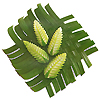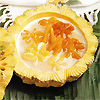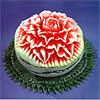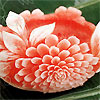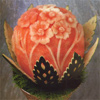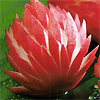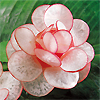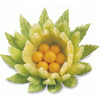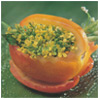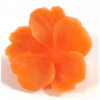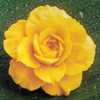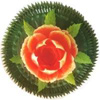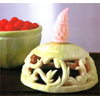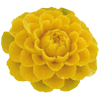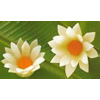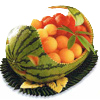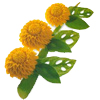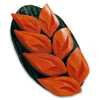How To Carve Fruit Tutorials
Learn how to carve fruits and vegetables with our growing section of Fruit Carving How To tutorials. Please check back frequently for new how to step by step directions to learn the fine art of fruit and vegetable carving.
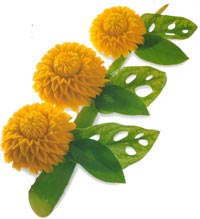 In Thailand, fruit carving is a traditional and highly cultivated art. The decoration of food and correct use of serving dishes is of utmost importance in Royal Thai Cuisine. Thus no account of Thai food can be complete without mention of the importance given to food and meal presentation. The ingenuity of all Thai palace crafts and cooking lies in the artists' attempt to create natural and realistic masterpieces.
In Thailand, fruit carving is a traditional and highly cultivated art. The decoration of food and correct use of serving dishes is of utmost importance in Royal Thai Cuisine. Thus no account of Thai food can be complete without mention of the importance given to food and meal presentation. The ingenuity of all Thai palace crafts and cooking lies in the artists' attempt to create natural and realistic masterpieces.
The Thais are very artistic and have a deep appreciation for beauty as evidenced by classical Thai dancers elaborate costumes and temple architecture. Thus, the pleasing presentation and decoration of Thai food is innate to the culture. It is an yet another Thai adaptation of a foreign art, Japanese Mukimono, which is the art of fruit and vegetable peeling.
| Fruit Carving How To |
| Art of Thai Fruit Carving |
In Thailand, fruits such as melon and pineapple are carved into boats and bowls to grace buffet tables. Vegetables including carrots, pumpkins, scallions and radishes are transformed into roses and carnations. Mythological figures are carved in ice in glistening impermanence in Bangkok four star hotels. Tiny ginger roots are carved into detailed shapes of flowers, crabs and shrimps and preserved for years. Pineapples, papayas and various fruits are carved in traditional designs and hallowed out to become containers for fruit salads, fried rice or sauces.
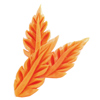 "Salads, fresh vegetable dishes and fruit presentations become works of art, transforming humble harvests into incredible edibles. Banana leaves are fashioned into baskets and cups for food and used as platters. When assembling a platter of raw vegetables for a party, the Thai will carve them into flowers, leaves and even fish and crab shapes. With occasional discreet application of food coloring the whole array will then be assembled with the loving care and artistry implicit in formal flower arrangement." (Source: Original Thai Cookbook, Jennifer Brennen, p.56, © Perigee Trade 1984)
"Salads, fresh vegetable dishes and fruit presentations become works of art, transforming humble harvests into incredible edibles. Banana leaves are fashioned into baskets and cups for food and used as platters. When assembling a platter of raw vegetables for a party, the Thai will carve them into flowers, leaves and even fish and crab shapes. With occasional discreet application of food coloring the whole array will then be assembled with the loving care and artistry implicit in formal flower arrangement." (Source: Original Thai Cookbook, Jennifer Brennen, p.56, © Perigee Trade 1984)
Serving food attractively is an art that has been practiced for centuries. Thai cookbook author Marie Wilson comments, "The appearance of Thai food is most important and is always commented upon by the Thais as much as taste." Here at the Temple of Thai we hope to present a few simplified fruit carving techniques for Western kitchens that both novices and experienced carvers can recreate.
| Mukimono |
The Art of Japanese Fruit and Vegetable Carving
Mukimono's origins begin in ancient times when food was served in unglazed clay pottery. These rough platters were covered with a leaf before the food was plated. Artistic chefs realized that the cutting or folding of the leaf in different ways created a more attractive presentation. And so Mukimono began. But it did not become popular until not until sixteenth century. During this period, when Edo (Tokyo) became the new capital, Mukimono gained official recognition. Street artists created clever garnishes upon request. From those beginnings the art has developed into a most important part of every Japanese chef's training.
This information taken from the unfortunately now out of print book: Japanese Garnishes, The Ancient Art of Mukimono, by Yukiko and Bob Haydok, Henry Holt and Company NY, original © 1980, Owl Edition © 1989.
| Fruit Carving How To |
Print out these PDF's from some of our most popular fruit and vegetable carving books and start step-by-step to create your own beautiful carvings and garnishes. These clear Fruit Carving How To instructions aided by our high quality professional carving tools and knives imported from Thailand will insure your efforts will be rewarded with success.

- Carrot Carnation and Champa Flower Carving, from Art of Garnish
- Basket Full of Flowers Carving, from Art of Thai Carving
- Papaya Fish Carving, from Exquisite Cuisine
- Taro Root Carved Covered Dish, from Exquisite Vessels
- Papaya Leaf Carving, from Step by Step Vegetable and Fruit Caring
- Rose Periwinkle Carving from Variety of Flowers
- Onion Lotus, from Vegetable Carving
| Buy Carving Books & Tools |
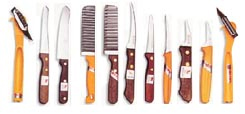
Find vegetable garnishing ideas in our fruit carving books and videos. Get the necessary professional carving tools and garnishing knives. Here you will learn simple garnishing techniques for gourmet garnishes. Welcome to the Temple of Thai!

